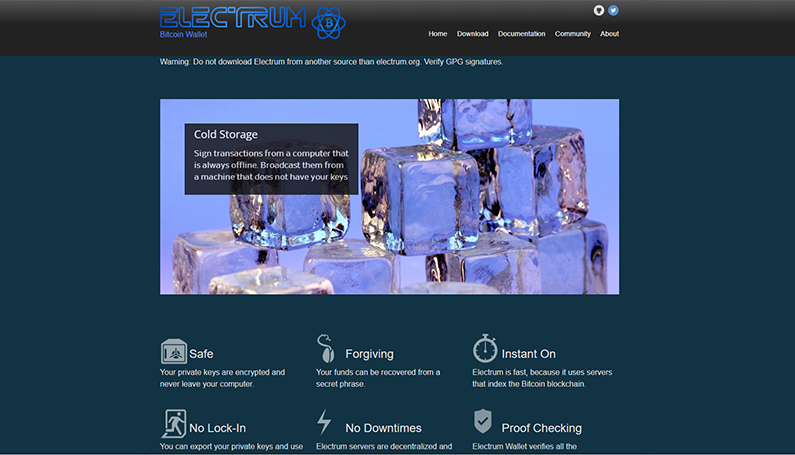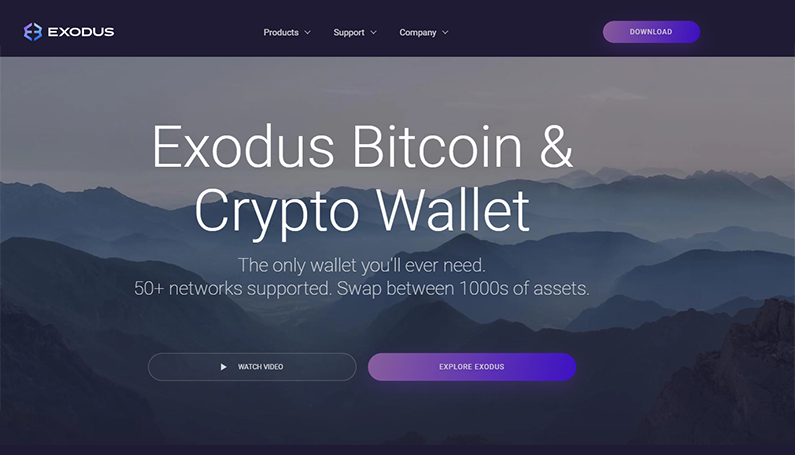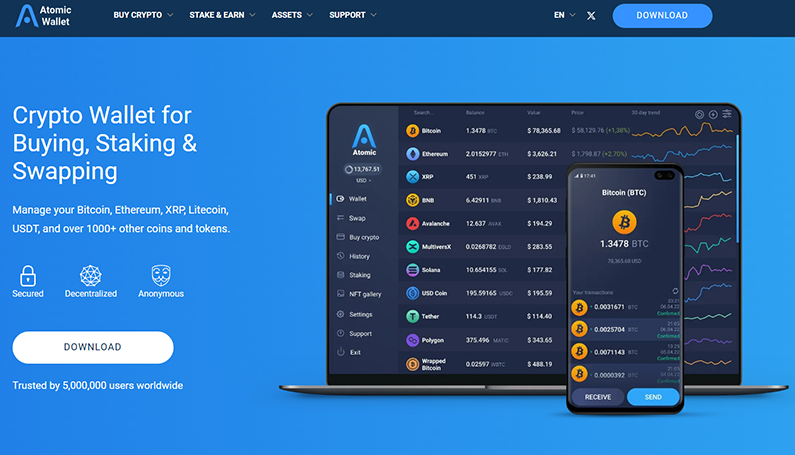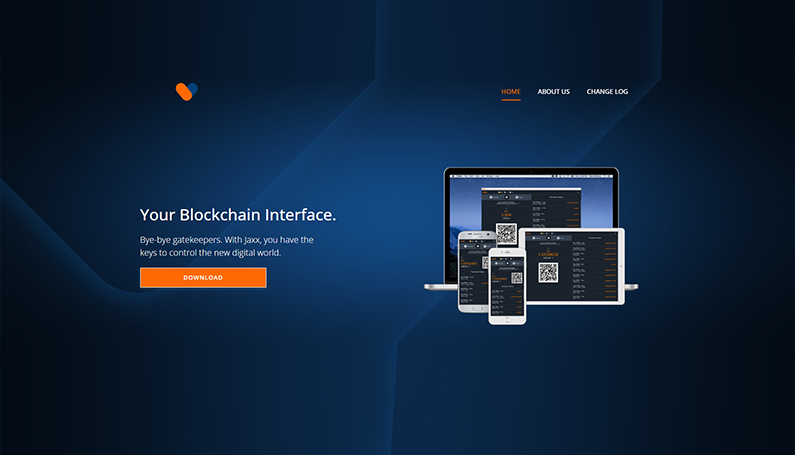Desktop wallets play a crucial role in the cryptocurrency ecosystem, offering users secure storage and convenient access to their digital assets directly from their computers. Whether you're new to crypto or a seasoned trader, choosing the right desktop wallet can significantly impact your experience.
What are Desktop Wallets?
Desktop wallets are a type of cryptocurrency wallet that is installed and runs on a desktop computer. Unlike web-based wallets that operate through a browser or mobile wallets designed for smartphones, desktop wallets are typically downloaded and installed as software applications directly onto a user's desktop or laptop.
These wallets offer users a more secure and private way to manage their cryptocurrency holdings compared to online wallets, as they store the private keys locally on the user's device rather than on a remote server. This local storage enhances security by reducing the risk of online attacks and hacking attempts.
Desktop wallets come in various forms, ranging from lightweight wallets that only support specific cryptocurrencies to full-node wallets that require downloading the entire blockchain of a particular cryptocurrency. Users can send, receive, and store their digital assets through these wallets, accessing features like transaction histories, address management, and sometimes even integration with decentralized applications (DApps).
Overall, desktop wallets provide cryptocurrency users with greater control over their funds and transactions, offering a balance between security, functionality, and user control compared to other types of wallets.
Key Features of Desktop Wallets
Desktop wallets play a crucial role in securely storing and managing cryptocurrencies directly from your computer. They offer a range of features designed to enhance security, usability, and flexibility for cryptocurrency users. Here are some of the key features that make desktop wallets indispensable tools for managing digital assets:
- Security Protocols: Desktop wallets prioritize security with robust encryption protocols, ensuring that your private keys and sensitive information remain protected against cyber threats.
- Offline Storage: Unlike online wallets, desktop wallets store your cryptocurrency keys locally on your computer, reducing the risk of hacking and unauthorized access.
- Backup and Recovery: They often provide mechanisms for backing up and recovering your wallet data, such as mnemonic phrases or seed keys, ensuring you can regain access in case of device failure or loss.
- User Control: Desktop wallets give users full control over their funds and transactions without relying on third-party services, promoting autonomy and privacy.
- Compatibility: They are compatible with multiple operating systems like Windows, macOS, and Linux, offering versatility to users across different platforms.
- Integration with Hardware Wallets: Many desktop wallets support integration with hardware wallets, adding an extra layer of security by keeping private keys offline.
- Transaction History: They maintain a detailed transaction history, allowing users to track their spending, receipts, and balances conveniently.
- Multi-Currency Support: Some desktop wallets support a wide range of cryptocurrencies, enabling users to manage various digital assets within a single interface.
- User Interface: They often feature user-friendly interfaces with intuitive navigation, making it easy for both beginners and experienced users to manage their crypto holdings effectively.
- Community Support and Updates: Desktop wallets benefit from active community support and regular updates, ensuring they stay current with security enhancements and new features.
Why Choose Desktop Wallets?
Desktop wallets offer a secure and versatile solution for managing your cryptocurrencies directly from your computer. Here are compelling reasons why many users prefer desktop wallets over other options:
- Enhanced Security: Desktop wallets store your private keys locally on your computer, reducing the risk of online hacks and unauthorized access compared to online wallets.
- Offline Storage: Unlike web-based wallets, which are vulnerable to online threats, desktop wallets keep your cryptocurrency keys offline, providing an added layer of security.
- Full Control: With desktop wallets, you have full control over your funds and transactions. You don't rely on third-party services, ensuring autonomy and privacy in managing your digital assets.
- Backup and Recovery: They offer reliable backup and recovery options, such as mnemonic phrases or seed keys, ensuring you can regain access to your wallet even if your computer fails or is lost.
- Compatibility: Desktop wallets are compatible with various operating systems like Windows, macOS, and Linux, catering to a wide range of users regardless of their preferred platform.
- Integration with Hardware Wallets: Many desktop wallets support integration with hardware wallets, combining the security of offline storage with the convenience of desktop accessibility.
- Multi-Currency Support: They often support a diverse range of cryptocurrencies, allowing you to manage multiple digital assets within a single wallet interface.
- User-Friendly Interface: Desktop wallets typically feature intuitive interfaces that make it easy for both beginners and experienced users to manage their crypto holdings efficiently.
- Regular Updates and Support: They benefit from active community support and regular updates, ensuring they stay secure and up-to-date with the latest features and enhancements.
Top 5 Picks for the Best Desktop Wallets of 2025
Selecting the right desktop wallet is essential for effectively managing and securing your cryptocurrencies. Here's an extensive overview of the top 5 desktop wallets for 2025, highlighting their features, functionalities, and advantages:
1.Electrum
Electrum is a lightweight and secure Bitcoin wallet known for its speed and simplicity. It's designed to be fast and easy to use, making it suitable for both beginners and advanced users alike.
- Security: Utilizes strong encryption methods and supports integration with hardware wallets like Ledger and Trezor for added security.
- User Control: Provides users with full control over their private keys, ensuring autonomy in managing their funds.
- Compatibility: Available on Windows, macOS, Linux, and Android platforms, offering broad accessibility across different devices.
- Transaction Options: Supports both standard transactions and Segregated Witness (SegWit) transactions, optimizing transaction speed and cost efficiency.
- Community Trust: Established over a decade ago, Electrum has a strong community following and undergoes regular updates to maintain security and functionality.

2.Exodus
Exodus is a visually appealing multi-asset wallet designed with a focus on user experience. It supports a wide range of cryptocurrencies and provides integrated exchange services for seamless trading.
- User Interface: Offers a beautifully designed interface that is intuitive and easy to navigate, making it ideal for users new to cryptocurrency management.
- Multi-Currency Support: Supports over 100 cryptocurrencies, allowing users to manage diverse digital assets within a single application.
- Integrated Exchange: Enables users to trade cryptocurrencies directly within the wallet, reducing the need for external exchanges and enhancing convenience.
- Security: Implements strong encryption and backup features to safeguard user funds and private keys.
- Customer Support: Provides responsive customer support to assist users with wallet-related queries and issues.

3.Atomic Wallet
Atomic Wallet is a decentralized multi-currency wallet known for its security features and integrated atomic swaps, enabling direct peer-to-peer exchanges between different cryptocurrencies.
- Decentralized: Operates on a decentralized platform, giving users full control over their funds and private keys.
- Multi-Asset Support: Supports over 500 cryptocurrencies and tokens, providing extensive diversity for managing crypto portfolios.
- Atomic Swaps: Facilitates direct cryptocurrency exchanges without the need for intermediaries, enhancing privacy and reducing transaction fees.
- Built-in Exchange: Integrates a built-in exchange for seamless cryptocurrency trading within the wallet interface.
- User-Friendly: Features an intuitive interface with comprehensive asset management tools suitable for both beginners and experienced users.

4.Jaxx Liberty
Jaxx Liberty is a multi-platform cryptocurrency wallet known for its cross-device compatibility and support for a wide range of cryptocurrencies.
- Cross-Platform: Available on desktop (Windows, macOS, Linux), mobile (iOS, Android), and as a Chrome extension, ensuring accessibility across various devices.
- Multi-Currency: Supports a diverse array of cryptocurrencies, allowing users to manage multiple digital assets from a single wallet interface.
- Portfolio Tracker: Provides a detailed overview of the user's cryptocurrency portfolio, including real-time market data and performance tracking.
- Security: Employs robust security measures and allows users to control their private keys for enhanced security and peace of mind.
- Integration: Offers integration with ShapeShift for seamless cryptocurrency exchanges directly within the wallet.

5.Trust Wallet
Trust Wallet is a mobile and desktop wallet known for its integration with the Binance ecosystem and support for multiple blockchain networks.
- Multi-Chain Support: Supports various blockchain networks, including Ethereum, Binance Smart Chain, and more, enabling users to manage different digital assets.
- Staking and DeFi Access: Allows users to stake cryptocurrencies and access decentralized finance (DeFi) applications directly from the wallet interface.
- Security: Implements industry-standard security features such as biometric authentication and backup options to protect user funds.
- Cross-Platform Integration: Seamlessly integrates between desktop (Windows, macOS, Linux) and mobile (iOS, Android) devices for flexible management.
- Community and Development: Backed by a vibrant community and regularly updated to incorporate new features and security enhancements.

Frequently Asked Questions
1.Are desktop wallets safe?
Desktop wallets can be secure if used correctly. They offer control over your private keys, which is crucial for security. However, it's essential to choose a reputable wallet provider, keep your software updated, and implement additional security measures like strong passwords and two-factor authentication (2FA).
2.How do desktop wallets work?
Desktop wallets generate and store your cryptocurrency private keys locally on your computer. When you make a transaction, the wallet signs the transaction with your private key and broadcasts it to the respective blockchain network for verification and inclusion in the blockchain.
3.How do I choose the right desktop wallet?
Consider factors such as security features, user interface, multi-currency support, community trust, and development updates. Researching wallet reviews, user feedback, and security audits can help you make an informed decision.
4.Can I use the same desktop wallet on multiple devices?
Some desktop wallets offer cross-platform compatibility, allowing you to use the same wallet on multiple devices (e.g., Windows, macOS, Linux). However, ensure compatibility and synchronization of your wallet across devices to avoid potential issues.
5.Are desktop wallets suitable for long-term storage of cryptocurrencies?
Desktop wallets can be suitable for long-term storage if used securely. Consider additional security measures like hardware wallets or offline storage (cold wallets) for large amounts of cryptocurrency holdings.
6.What should I do if I lose access to my desktop wallet?
Immediately use your wallet's recovery seed phrase (backup phrase) to restore access. It's essential to keep this seed phrase secure and private. If you lose both your wallet and seed phrase, recovery may not be possible, resulting in the loss of your funds.